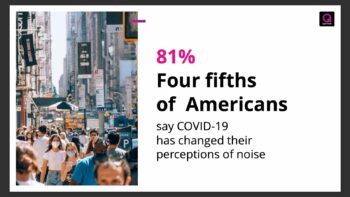
Quiet Down! Research Shows Perspective on Appliance Noise Shifting During COVID-19
Acoustic engineering is one of the compelling trends talked about during the CES 2022 show in Las Vegas. It is a topic well known to Quiet Mark, the global certification program associated to the UK’s Noise Abatement Society (est 1959). They asked an important question that every electrical appliance manufacturer needs to take into consideration:
How has COVID-19 and the Work From Home boom changed the way that Americans feel about noise in their homes and workspaces?
The vast majority of Americans (81%) believe COVID-19 has changed how they feel about noise in their environment, according to a survey of 1,000 U.S. adults by Wakefield Research for Quiet Mark.
The Wakefield Research breaks through the noise and provides key sound bytes:
Life Lessons: The pandemic has taught us many things, not the least of which is our innate need for calm: 44% of Americans have seen their need for peace and quiet increase during COVID-19.
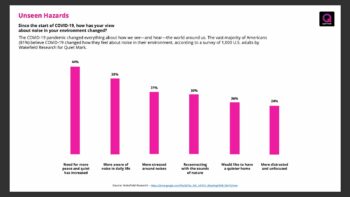
Space to Focus: Perhaps the widespread loss of dedicated workspace led workers to have a greater need for tranquility. Employed Americans are much more likely (54%) to have a greater need for peace and quiet since the start of COVID-19 than their non-employed peers (29%).
Sound of Silence: It seems likely the increase in solitary time during social distancing has indeed made Americans more aware of their surroundings. Nearly 2 in 5 Americans (38%) are more aware of noise and nearly a third (31%) are more stressed around noise than they were before the start of COVID-19.
“Because sound is invisible it is often overlooked. Yet, the fundamental impact it has on all the physical rhythms of our bodies, our hormones, heart-rate and brain waves is so profound and inherent to our well-being”, explains Poppy Szkiler, Quiet Mark CEO and CoFounder.
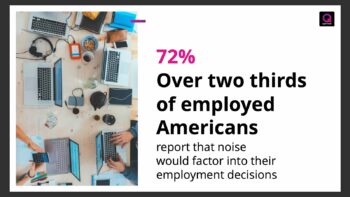
Work Life Sound Check: This growing awareness and sensitivity to noise is changing how many think about noise at work, as well. If they were to consider changing jobs, an astonishing 72% now say noise levels will play a role in future employment decisions. Employed Americans under 40 are more likely (78%) to see this play a role than their older counterparts (67%).
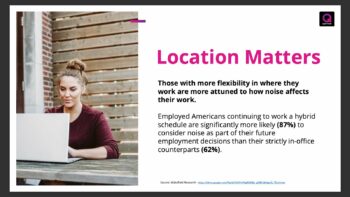 Location Matters: Those with more flexibility in where they work are more attuned to how noise affects their work. Employed Americans continuing to work a hybrid schedule are significantly more likely (87%) to consider noise as part of their future employment decisions than their strictly in-office counterparts (62%).
Location Matters: Those with more flexibility in where they work are more attuned to how noise affects their work. Employed Americans continuing to work a hybrid schedule are significantly more likely (87%) to consider noise as part of their future employment decisions than their strictly in-office counterparts (62%).
WFH (Work from Home) Hawks: The remote work experiment has opened eyes to new possibilities. More than 2 in 5 employed Americans (41%) would prioritize work from home in any future employment decision because it is quieter and enables them to concentrate better.
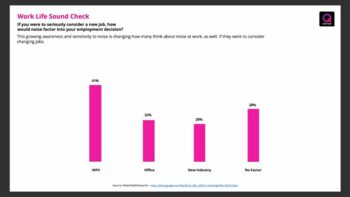
Office Fans: Conversely, some saw on-site work as more conducive to a positive working environment. Nearly a quarter (22%) of employed Americans would prioritize an on-site presence for any future employment decision, as they felt it was more productive than working at home.
Noise Matters: In fact, a significant number of Americans would take a different career path for a quieter work environment. 1 in 5 (20%) would work in a completely different industry to reduce their noise exposure.
“According to our latest public surveys commissioned by Quiet Mark, there is still a huge knowledge gap about this in North America, which often prevents noise reduction being made a priority in the design focus of new product development, yet unwanted noise is a serious pollutant,” claims Poppy.
Knowledge Gap: Despite these changes in how Americans view noise in their lives, most are still largely unaware of the immense dangers of noise pollution. More than a quarter of Americans (27%) cannot correctly answer 4 basic questions on noise pollution.
Beyond a simple annoyance, the ramifications of noise pollution are vastly underestimated:
- 74% did not know that noise is the second biggest killing natural pollutant after air pollution.
- A third of Americans (33%) are unaware of the impact of noise on human health, such as sleep disturbances, high blood pressure and even cardiovascular disease.
- Americans also underestimate how much noise it takes to do permanent harm. More than half (52%) assume the noise level of a rock concert is where hearing loss begins, around 110 decibels. But in reality, it takes much less. Hearing loss can begin at sustained noises of 70 decibels, equivalent to a vacuum cleaner or standing near a busy freeway. And those over 40 are much more likely (58%) to believe this myth than their younger peers (41%).
“A wave of silence spread across the planet during the first lockdowns of the pandemic. Man made noise dropped by up to 50% in most countries around the world. With this came a sudden appreciation that the planet, and our lives, had become too loud and that measures needed to be taken to prevent the volume from returning to pre-pandemic levels. Quiet Mark is on a mission to help create peaceful living,” states Poppy.
“Over the past 10 years we have driven change in manufacturing worldwide to prioritize noise reduction within the design of everyday machines, appliances, technologies and house build materials, creating the first one-stop platform for third party approved noise reduction solutions for every living space to improve health and increase well-being.”
In addition to its US poll, Quiet Mark recently created a UK National Noise Report – Pandemic Recovery Survey. With kitchens becoming the new WFH office, it’s no wonder over four fifths (82%) of Brits have appliances within their home that they would like to make less noise.
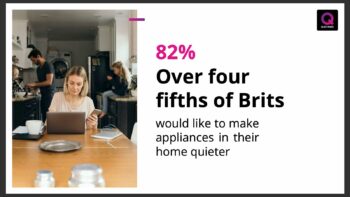
Over half (57%) of Brits would like their home to be quieter, with a further 62% noting that they are drawn towards quieter appliances. This is stronger amongst those aged 18-34 (66%) compared to those aged 55+ (54%). This love for quieter appliances transfers to the cost Brits are willing to pay, with two thirds (63%) of those 18-34 year old willing to pay more for quieter appliances.
Over half (57%) of Brits would like their home to be quieter, with a further 62% noting that they are drawn towards quieter appliances. This is stronger amongst those aged 18-34 (66%) compared to those aged 55+ (54%). This love for quieter appliances transfers to the cost Brits are willing to pay, with two thirds (63%) of those 18-34 year old willing to pay more for quieter appliances.
The UK survey, carried out by Opinium Research, sampling 2,000 UK adults aged 18+ across all regions also showed that almost four fifths (79%) of Brits say that it matters how loud an appliance is when purchasing one for their home, with 45% wishing their washing machine, and 43% their vacuum cleaner, were quieter than their current ones.
Through scientific testing and assessment Quiet Mark identifies the quietest products in multiple categories spanning many sectors, including home appliances and technology, building sector materials and commercial sector products. Only 10% to 20% of the quietest best performing products are awarded Quiet Mark certification.
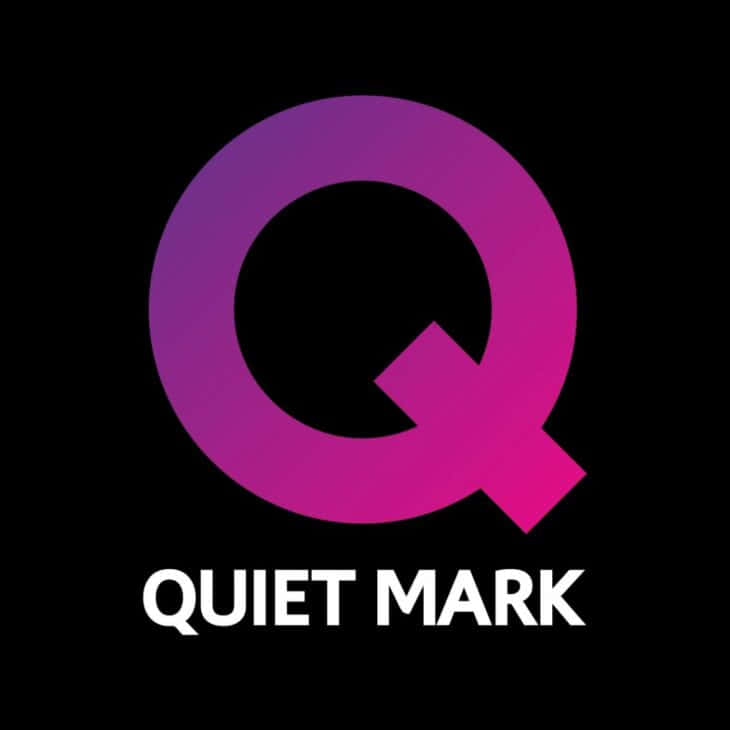
About Quiet Mark
Quiet Mark is the independent global certification program associated with the UK Noise Abatement Society charitable foundation (est.1959). Through scientific testing and assessment Quiet Mark identifies the quietest products in multiple categories spanning many sectors, including: home appliances and technology, building sector materials and commercial sector products.